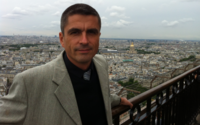We use cookies to optimise the design and performance of our websites. By continuing to browse this website, you agree to the use of cookies. Find out more about our cookies and how we use them.
Grégori Bassaud
 Executive MBA
Executive MBA- Go back
Your Recruitment Managers
Marie COFFIN • +33 6 08 35 00 63
Célia KAUFFMANN • +33 6 31 03 02 74
Ali ELYASSARI • +33 6 72 14 58 37
A single e-mail: exec_mba@eml-executive.com
Former French Army officer takes to business battlefield in ranks of EMLYON MBA.
Grégori Bassaud is an IMBA candidate at EMLYON Business School, based in France.
A former Army officer with two decades of experience leading teams and organizing complex projects, he is hoping to transfer such skills to the business of sport. He aspires to work on major sports industry projects, such as the Olympic Games or Tour de France, and an MBA is his route to making that dream a reality.
GrĂ©gori enrolled at EMLYON in September last year. Before that, he was a director at the French Ministry of Defence, where he oversaw 200 staff. His military career has included positions such as platoon leader of an overseas airborne infantry battalion. He was also a platoon leader at the United Nations, where he served in the Central African Republic.Â
Why did you decide to begin an MBA degree?
I have had an exciting career in the Army for the past 20 years. But when I become a father in 2009, I started considering a safer job, and wanted to spend more time at home. I was initially looking for a specialized master’s program in sport industry management. I was advised to consider an MBA for several reasons - notably to join a cohort where my classmates would be more experienced and diverse. Â
What made your business school stand out from the rest?
The school has a very good reputation in France and in Europe and overseas. But what impressed me most about EMLYON was the remarkable quality and diversity of the faculty.
The school also places much emphasis on entrepreneurship. The commitment to this is strong.
Also, the amazing alumni network and the devoted career service [were attractive].Â
How would you describe the culture at your business school?
I sense that there is a real willingness to be open to all opinions. Apart from the core courses, you are able to attend lectures with unusual guests.
Which aspect of the MBA has been the most valuable?
I really appreciated all the courses related to managing skills in a multicultural environment — in particular the personal development and the organizational behaviour courses. This was complemented with study trips, one to Geneva, related to world trade, and one to Finland to deal with innovation. After that, you feel comfortable joining an international firm.
What advice would you give to people who are about to apply to business school?
The MBA is really valuable if everyone in the cohort has significant professional experience.
Don’t rely on the minimum work experience requirement, but instead wait until you have seven or eight years of real professional experience, excluding internships. Otherwise, you may be disappointed when you look for a job, because neither you nor your colleagues will have a strong network to support each other.Â
What was your biggest challenge at the French Ministry of Defence?
The biggest challenge when you are in the Army is to be able to permanently adapt. You have to adapt to various environments and cultures. You have to learn everything about an ongoing situation in a very short space of time. Once I was sent to Kosovo on very short notice, less than a day.
Another challenge is the projects you have to manage, such as field training exercises. As an officer, you are given responsibilities as soon as you join and they continue to grow.
I was once in charge of a bi-national joint exercise in the Dominican Republic in 2012, which I had to design, implement and conduct. It’s was a big challenge, requiring planning and relationship skills. I’m proud of this achievement.
What are your future career plans?
I’m fond of sport. That’s why I intend to use the MBA to leverage my project management and interpersonal skills, which I inherited from the military, in order to work in the sports events industry.
I’m interested in joining the International Olympic Committee, or a company such as A.S.O, the owner of the Tour de France, which is the kind of project that people dream of organizing. I would like to grow in one of these firms and reach an influential position. Becoming a major player in this market is my goal.

